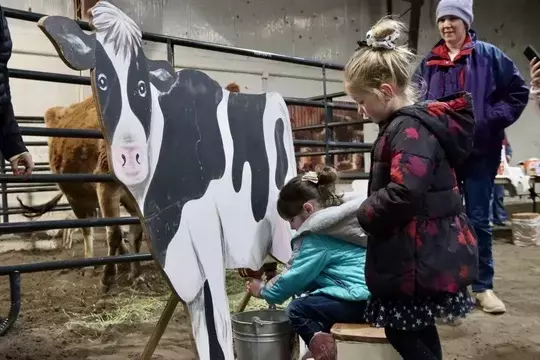Every year, a special event takes place in Carbon County where hundreds of young minds gather to learn about the fascinating journey their food takes before reaching their plates. This educational experience not only entertains but also enlightens children about the vital role agriculture plays in their daily lives.
Unveiling the Secrets Behind Farm-to-Table Practices
The initiative by Carbon County Farm Bureau aims to bridge the gap between urban lifestyles and rural agricultural practices. Through interactive sessions and hands-on activities, students gain invaluable insights into the complexities of food production.Agricultural Adventures Await
As part of the program, over 350 enthusiastic participants embarked on an agricultural odyssey at the Fairgrounds Indoor Arena. The event was meticulously organized with various stations designed to captivate and educate. Each station offered unique experiences that brought theoretical knowledge to life. For instance, children marveled at live chicks and turkey poults, gaining firsthand exposure to these creatures' characteristics and behaviors. Additionally, they encountered a honey station adorned with beekeeping equipment and a beehive, unraveling the intricate world of bees and their essential contributions to pollination.Another highlight was the corn station, where kids discovered the versatility of this crop and its significance in both human consumption and livestock feed. Meanwhile, interactions with goats, bunnies, cows, and a horse provided opportunities for tactile learning and emotional connections with animals. One particularly memorable moment involved Jezebel, a milk cow accompanied by her calf. Educators explained the astonishing fact that Jezebel consumes an entire bathtub of water daily to sustain her milk production. Furthermore, they elaborated on the diverse products derived from cows, such as milk, ice cream, Jell-O, and even Band-Aids, sparking curiosity and wonder among the attendees.Hands-On Learning Experiences
Beyond passive observation, the event encouraged active participation through engaging activities. Children enthusiastically delved into dirt, extracting earthworms and experiencing the texture of soil firsthand. At another station, they engaged in simulated cow milking using fake udders, fostering an appreciation for the labor-intensive process of dairy farming. Moreover, the "How to Grow Your Pizza" station captivated young learners by illustrating the timeline required to cultivate and harvest each pizza ingredient. This demonstration emphasized patience and diligence in agricultural endeavors while reinforcing the importance of sustainable practices.Community Support and Collaboration
The Health Department's Parents as Teachers program played a pivotal role in enhancing the event's impact. This home-visiting initiative caters to families with children ranging from prenatal stages to kindergarten age. Twice monthly visits by nurses focus on family development, ensuring holistic support systems are in place. Amy Ruggeri, director of the program, highlighted the value of such events in providing access to farm animals for families who may not otherwise have these opportunities. The integration of community resources amplifies the educational reach and fosters a collaborative environment conducive to learning.Empowering Future Generations
By the culmination of the event, it became evident that the participants had acquired profound insights into the intricacies of food production. From understanding the necessity of composting to appreciating the significance of branding animals, each detail resonated deeply with the young audience. Such awareness instills a sense of responsibility towards sustainable agricultural practices and encourages thoughtful consumption habits. Ultimately, initiatives like the Farm Field Day serve as catalysts for nurturing informed citizens who recognize and respect the origins of their sustenance.You May Like

